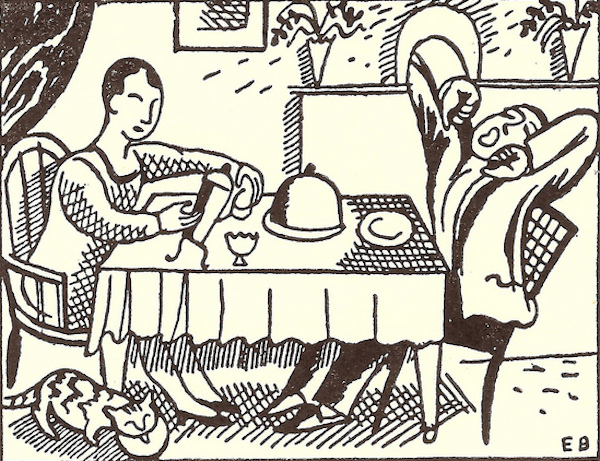Sadie Stein wrote earlier today about Balzac, who was famously enamored of coffee—especially coffee on an empty stomach—as a creative agent, so much so that it probably killed him. On the other end of the spectrum is J. M. Holaday, a—scholar? an armchair scientist? he’s a man about whom Google reveals little—whose sole publication, an essay called “Coffee-Drinking and Blindness,” survives him. The piece appeared in the North American Review in September 1888. Rhetorically marvelous if scientifically unsound, it argues emphatically that drinking too much coffee will make you go blind. And this was not, to Holaday’s mind, mere conjecture. He begins his essay with bold certitude:
I am satisfied that defective vision and blindness will pretty soon be a prominent characteristic among the American people … I make this assertion without having seen any statistics whatever on the subject of blindness. I found out long ago that a cup of coffee leaves a night-shade on the brain which continues longer than an eclipse of the sun. For some time past I have been consulting with different persons in Council Bluffs, who are suffering with failing sight, and in each instance I ascertained that the unfortunate person was and is a regular coffee-drinker.
Indubitable evidence! Correlation does imply causation! Lest you fear that Holaday is a plant—a tea lobbyist, maybe, or a cola manufacturer—he’s quick to note that he was once fond of coffee himself, though he “now feel[s] free of the coffee-drinking vice, and will have no more trouble with it unless I shall again fall a victim to some church supper or to the magnetic blandishments of some buoyant hostess.”
Rather than using the remainder of the essay to bolster his blindness thesis, Holaday turns broadly polemical, and in the essay’s finest section he muses on the deleterious effects of coffee upon our organs, those “little urns of vitality”:
Children that are allowed to partake freely of coffee will become restless, fussy and noisy, half wild with mischief. They probably advance in their school studies with abnormal rapidity. But they hate work. At times they are indifferent about education. Their strength goes to the brain. They grow rapidly, but not aright. They develop into men and women three years too soon. Yet their eyes dance with angelic splendor, and their cheeks glow with vermilion, providing that they started in life with robust constitutions. If they began life with puny physiques, however, coffee will make them slim and ghostly, and their eyes and features flat. Coffee will seem to improve those persons only who have a surplus of constitutional vigor. These individuals will seem possessed with forms and faces of marvelous grace and finish, yet they will fade all too soon, and fall into the hands of the doctor. Coffee has a magical effect on the heart and circulatory system, and for a while produces the intoxication, which approaches that of opium or cocaine. It causes a swift growth and swift decay. It produces beauty and exhilaration, but not endurance. It gives a sentimental strength—the strength that pertains to runts. The best thing that can be said of coffee is, that it has a tendency, like opium, to make lawless persons tame … Coffee eats into the digestive membranes, forcing their glands to pour forth their reserve of juices, thus drying up the fountains of life and leaving in these little urns of vitality the seeds of rheumatism, catarrh, kidney ailment, heart disease, lung infirmity, and abdominal degeneration. Coffee-drinking exhausts the mouth and throat, leaving the face a grinning skeleton, while the body is honeycombed. The penetrative and stimulating qualities of coffee are excessive as well as insidious. But nature abhors anything that leads nature, and will gradually withdraw from it, leaving in the temple of life nothing but a shadow and a name.
Plenty of apparently robust persons will rise up serenely when they read this dissertation, and exclaim: “I have drank coffee forty years, and I am as stout as an ox” … But the coffee-drinker, however robust he may be, will put on a pair of spectacles at a comparatively early period of his life. Besides, he is all the while enslaving himself to a habit—a fact that is full of foreboding. Again, he is surely approaching a time when his reserve force of vitality will all be prematurely used up—a period in his career that will begin a new volume in the coffee-drinking habit, for every cup of it will now fill him with fire, while his helpless desire for it continues to increase. To a ten-year-old boy of this city I remarked, a few days ago, “You must quit drinking coffee, or else you will never be anything but a runt.” He replied, “Oh, no; I couldn’t live without it.” In conclusion I will add, in the language of Dr. O’Leary, that “The thing which we think we must have is always that which is killing us.”
Read the whole essay, if you remain unconvinced and/or unstirred, here.
